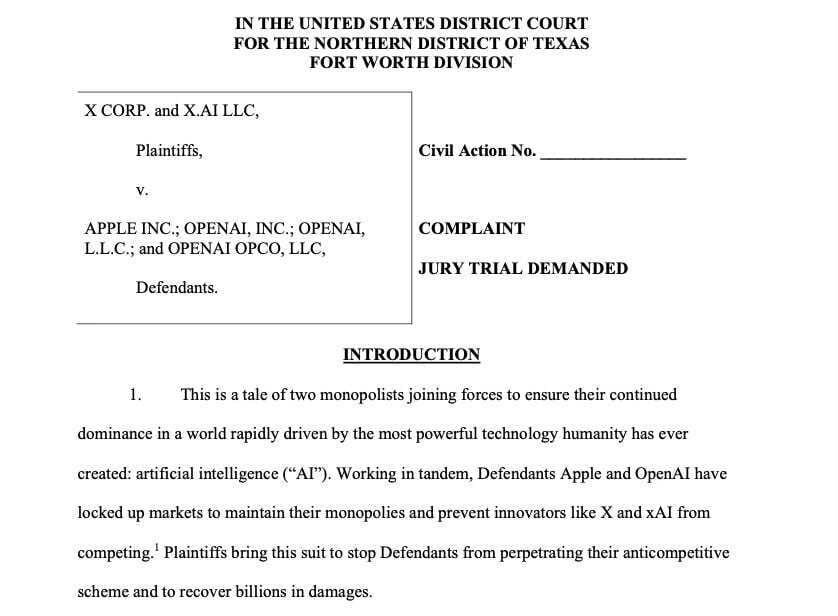- Pascal's Chatbot Q&As
- Posts
- The outcome of X v. Apple and OpenAI could define not just the balance of power in tech, but the principles that govern AI’s deployment at scale.
The outcome of X v. Apple and OpenAI could define not just the balance of power in tech, but the principles that govern AI’s deployment at scale.
It’s a flashpoint in the battle for control over AI’s interface with consumers. Courts, regulators, and innovators around the world will be watching closely.
Elon Musk’s Antitrust Lawsuit Against Apple and OpenAI – A Tech Monopoly Showdown with Global Consequences
by ChatGPT-4o
On August 25, 2025, Elon Musk’s companies, X Corp. and xAI LLC, filed a high-profile antitrust lawsuit in the U.S. District Court in Texas against Apple Inc. and OpenAI. The lawsuit accuses Apple and OpenAI of forming an unlawful and exclusive partnership that stifles competition in both the AI and smartphone markets. This legal action marks one of the most significant antitrust battles in the era of artificial intelligence and could redefine market dynamics globally.
❗️Most Surprising, Controversial, and Valuable Allegations
1. Apple’s fear of super apps replacing smartphones
According to the lawsuit, Apple executives—including SVP Eddy Cue—reportedly feared that AI-powered super apps (like Grok) could “destroy Apple’s smartphone business,” much like Apple’s iPhone did to Nokia. Apple allegedly saw this as an existential threat and joined forces with OpenAI to stall that disruption.
2. Exclusive integration of ChatGPT into iOS
The lawsuit claims that Apple’s 2024 agreement with OpenAI makes ChatGPT the only generative AI chatbot natively integrated into Apple devices, cutting off Grok and other competitors from billions of prompts, and thereby from innovation and scaling opportunities. Apple allegedly refused integration requests from both Google and Anthropic.
3. Apple manipulating App Store rankings to suppress Grok and X apps
Despite Grok and X ranking high in category-specific lists (e.g. #1 in News, #2 in Productivity), Apple allegedly excluded them from its “Must-Have Apps” and delayed app updates to suppress competition. The claim suggests editorial bias and weaponization of app discoverability.
4. OpenAI giving ChatGPT to Apple for free
The complaint reveals that OpenAI is not charging Apple for ChatGPT integration. Instead, OpenAI views exclusive access to hundreds of millions of iPhone prompts as a form of payment, believing this scale will entrench its market dominance. It also alleges that Apple plans to extract a future revenue share once OpenAI monetizes its base through rising subscription fees.
5. Musk’s depiction of OpenAI’s “corruption”
The complaint devotes many pages to portraying OpenAI’s alleged abandonment of its founding mission. It references internal safety team resignations, FTC probes, board turmoil, and failed safety initiatives like the disbanded “Superalignment” team. Musk frames OpenAI as having prioritized monopoly rents over public good.
✅ Are Musk’s Grievances Justified?
Some grievances appear well-founded from an antitrust perspective:
Market lockout through exclusivity: If Apple integrates only one AI assistant at the operating system level, while suppressing rivals through App Store practices, that raises serious concerns under U.S. antitrust law, especially in light of the DOJ's ongoing scrutiny of Apple.
Scale-based network effects: Musk correctly identifies the importance of prompt scale in training LLMs. Exclusive access can lead to insurmountable barriers for new entrants—effectively giving OpenAI a permanent head start.
Consumer harm: The lawsuit reasonably argues that users are denied choice and innovation due to the lack of chatbot competition. The fact that iOS users cannot use Grok via Siri is particularly compelling.
However, Musk’s position is not without contradictions:
He co-founded OpenAI and helped shape its original nonprofit mission. Critics might argue he’s reacting to being left out of a now-lucrative venture rather than acting out of principle.
xAI and X Corp. are not neutral actors—they’re attempting to build their own super app ecosystem, making the lawsuit both self-serving and competitive strategy by legal means.
🌍 Consequences Depending on the Outcome
If Musk/xAI wins:
Legal precedent for AI competition: Courts could define AI assistant markets as distinct and protected under antitrust laws, forcing Apple (and others) to allow alternative AI integrations.
Disruption of default AI relationships: Companies like Apple, Samsung, and Microsoft may be pressured to adopt multi-AI integrations, restoring choice and reducing vendor lock-in.
AI developers gain leverage: Emerging players like Grok, Claude, and Gemini may demand equal access to OS-level features, interfaces, and user prompts.
Regulatory ripple effects: The EU, UK CMA, and FTC may cite this case in shaping new AI-specific antitrust frameworks, especially around bundling, interoperability, and platform power.
If Apple/OpenAI prevail:
Platform dominance entrenched: Apple’s ability to tightly couple OS features with exclusive AI tools will become a norm, extending Big Tech's power over distribution.
First-mover monopoly codified: OpenAI’s early scale advantage and platform exclusivity may become de facto justifications for keeping rivals out—raising the bar for all future LLM entrants.
Regulatory hesitancy: A judicial win could dampen global regulators’ willingness to intervene in AI platform bundling, emboldening vertical integration across AI value chains.
🧭 Final Thoughts
This lawsuit is about more than Musk’s ambition—it’s a flashpoint in the battle for control over AI’s interface with consumers. Whether one sees Musk as a market reformer or opportunist, his case raises critical questions: Should a few companies control how AI is accessed, integrated, and monetized? Or should AI—like search before it—be subject to competitive pressure, interoperability, and user choice?
The outcome of X v. Apple and OpenAI could define not just the balance of power in tech, but the principles that govern AI’s deployment at scale. Courts, regulators, and innovators around the world will be watching closely.
